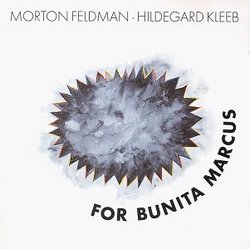| All Artists: Morton Feldman (Composer), Hildegard Kleeb (Piano) Title: Morton Feldman: For Bunita Marcus - Hildegard Kleeb, Piano Members Wishing: 3 Total Copies: 0 Label: Hat Hut Release Date: 4/11/1994 Genres: International Music, Jazz, Classical Styles: Avant Garde & Free Jazz, Historical Periods, Modern, 20th, & 21st Century Number of Discs: 1 SwapaCD Credits: 1 |
Search - Morton Feldman (Composer), Hildegard Kleeb (Piano) :: Morton Feldman: For Bunita Marcus - Hildegard Kleeb, Piano
 | Morton Feldman (Composer), Hildegard Kleeb (Piano) Morton Feldman: For Bunita Marcus - Hildegard Kleeb, Piano Genres: International Music, Jazz, Classical
|
Larger Image |
CD Details |
CD ReviewsLast of piano's timbre to traverse ,to hold, to make scarecrow | Chicago, Illinois United States | 10/23/2006 (5 out of 5 stars) "this was Feldman's last composition for piano solo, it is almost as long as his other oceanic length piece "Triadic Memories",(circa 79:27) but "For Bunita Marcus"(circa 77:00) is a much more concentrated, focused journey. It remains contented with a few tones,it is more memorable a dim-light you become accustomed to prior to your entrance into this music. It is more "goal-oriented",its melos,its self-evident shapes searches for something asking questions so one can follow it with its simple gentle tones. It takes considerable performative skill to place this simplicity, and bring it to itself, to inhabit itself unpretenciously. And it is incredible that it is music you cannot do anything with except listen. It,the music's implications doesn't invite a continuation of itself, it is self-contained, existing for itself or the listener. There is also more room for the performer's persona to come through, much more than "Triadic Memories". If you have heard John Tilbury (entire Box Set ISBN 3-221-80132-7)for readings to compare against,you may find this helpful, if distracting; but here as well,Hildegard Kleeb brings herself to the work, the sensitivity to the works restained beauty.Tilbury has more questions to ask, there is more disquiet below the surface. All is established, You really cannot do much with it,but play it over and over,perhaps the play of resonance should be thought through more clearly and to make its obvious shapes not more obvious than already implied; its lines are self-evidence.We do not seem to mind the length, if this music succeeds, it does so by taking the time it needs without overburdening the durational frame it does adopt.Feldman is perhaps one of the few working with high levels of abstraction to timbre, certainly more than Barlow, Messiaen or Sorabji other oceanic travelers of durations.Their music is more traditional utilizing already tested musical forms,as the "expanded" Baroque Suite. As you listen to Feldman here the piano timbre does become transformed into something else,other than itself; the repetition allows the timbres to transmogrify into barely inperceptible differenences.
It is curious how we may need this music more than ever,as a spiritual source, much like the massive iron shapes of Richard Serra. Feldman with this work in particular does suggest a timelessness an aesthetic durability that has nothing to do with the vagaries that has entered the world of the aesthetic with the advent of postmodernities more negative gratuitous obsessions.Postmodernity itself inherited alienations schemes just as destructive as its "Father-High modernity" but we tend not to look, for we are in a state of playful bliss with performance art and video concoctions.Feldman rethought through the materials, the concept of repeated music (minimalisms.Whereas other creators are now merely caricatures of their former selves.Here this piece allows us to return to something perhaps forgotten, given the excessive speeds in which the aesthetic, the consumer art product is consumed today." |

 Track Listings (1) - Disc #1
Track Listings (1) - Disc #1